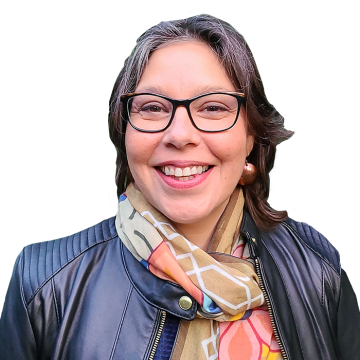Leslie Harper
2023 Bush Fellow

Leslie Harper (Leech Lake Band of Ojibwe) is determined to help Tribal communities create their own futures. Raised by parents who deeply instilled the values of sovereignty and self-determination, she believes that priorities and decisions must be determined from within a community, not from an outside entity. A Native American language revitalizer, she has built an immersion school and led national efforts to ensure the rights of Indigenous students and families in immersion settings. She wants to build hope and optimism by helping Native communities articulate their own culturally appropriate outcomes, approaches, and evaluation measures. During her Fellowship, she will seek mentorship and build the facilitation skills she needs to mobilize her community and prepare others to lead. She will also travel to other language revitalization sites to connect with leaders engaged in language reclamation. She will maintain energy for her work through regenerative rest and ceremonial participation.
What has informed your approach to leading change in your community?
The self-determination era and my family and community really informed me. We were so excited that policies allowed us to run our own affairs, but then we had to do it! This is what my whole life has been about – just do it. Now, we run our own health care systems, create our own education systems. I remember my community members coming together for cookouts in our backyard and sharing what they learned about creating a school – figuring out who in our community had the strengths and who would lead. I watched and listened. This is how I was raised. I watched my parents, grandparents, aunts and uncles use self-determination to take control of their own agency.
What was your first job? Were there any big lessons you learned?
This is a hard question for me to answer because it brings up mixed emotions. It’s actually what I learned on my first job cleaning cabins at a local resort in the northlands of Minnesota. At an early pre-teen age, I was cleaning cabins at resorts owned by non-Natives on the shorelines of my people’s land. This is land that we Ojibwe no longer have access to because of U.S. government policies. Ojibwe people are canoe people. We are water people, but we have reduced access to our waters due to oppressive systems that favor non-Natives to own and enjoy our homelands while we are unable to participate fully in the same way.
While working at those resorts, I remember thinking, “This should be ours, not the tourists who come in for a short time, make all the money while local Ojibwe people do the menial jobs and get paid so little, as an afterthought.” It was hard and yet, I had to make money to help take care of myself despite the inequities. So, it taught me how to consider reclaiming our Ojibwe land and waters, and how to create jobs with dignified pay and dignified considerations of Ojibwe priorities. That’s what cleaning cabins in the northland REALLY taught me.
What is your favorite quote or expression?
“Hope is a discipline and we have to practice it every day.” –Mariame Kaba
To me, this means we must be intent in our practice and actions. It takes energy, effort, and time to hold a vision of the future and to create the conditions to get there. I believe ideas around organizing and collective care help with maintaining this energy and intent. Others can help carry the load when one is struggling, and we all can develop and contribute to the future. This is very in line with my thinking around agency, self-determination, and decision-making in our communities.